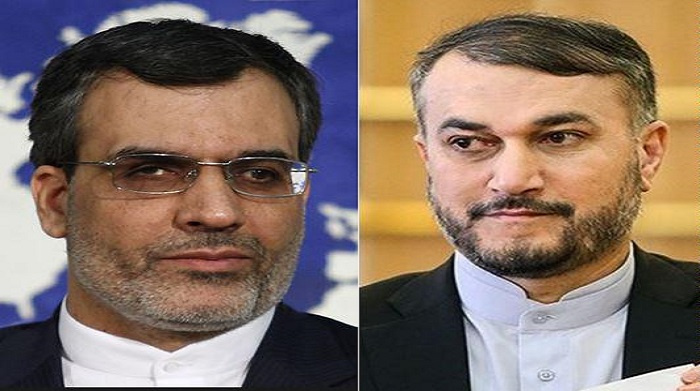Has Zarif Just Discharged Resistance’s Best Advocate?

By the Editors
On Friday, Al-Monitor’s Laura Rozen quoted sources who met Iranian Foreign Minister Mohammad Javad Zarif, in Oslo, Norway, saying he signaled that he had “more authority on the Syria file” and that Iran might be prepared to show more flexibility to advance a political solution. On Sunday, rumors Jahan News had started spreading four months ago turned out to bear an air of truth. In a decree on Sunday, Zarif appointed Hossein Jaberi Ansari as Deputy Foreign Minister for Arab and African Affairs. Jaberi Ansari replaced Hossein Amir-Abdollahian, who will serve as an advisor to Zarif.
A leftover from former President Ahmadinejad’s Foreign Ministry, Amir-Abdollahian had retained the post of Deputy FM for Arab Affairs for the past five years, from the inception of the Syrian crisis. Known among the Principlists as a ‘revolutionary diplomat’ who devoted himself to empower the axis of “resistance” in the region, he is believed to have close ties with IRGC commanders, including Qods Force Commander General Ghassem Soleimani. (In fact, he was the first Iranian official to deny reports of the commander’s injury in Aleppo.) His replacement with Jaberi Ansari has been interpreted by some as Iran’s shift in Syria policy, and many commentators in Iran are criticizing the move because, they claim, it has been the outcome of months of lobbying and pressure from both Arab leaders and the National Iranian American Council (NIAC), founded and headed by Iranian-Swede author and analyst, Trita Parsi.
Nuclear Iran, a website associated with former Iranian nuclear negotiator Saeed Jalili, reported Thursday that NIAC members believe Amir-Abdollahian will not be a good choice for the Rouhani administration if Iran wants to get involved in regional talks. “The lobby accuses Amir-Abdollahian of being more aligned with ‘other institutions’,” the outlet wrote. According to Nuclear Iran, but unsubstantiated, NIAC has now turned into one of the most influential teams in terms of the administration’s foreign policy in areas related to the United States.
Some analysts however do believe the reshuffling in Iran’s foreign policy team indicates a shift in its positions regarding the region. After all, nearly a decade after it was stripped of authority, the Foreign Ministry is focusing back on the region, supposedly to mend the country’s stagnating ties with Middle East powers, including most importantly the Saudi kingdom, which has drawn down its relations with the Shiite democracy to its lowest ebb since the late 1980s.
Zarif’s latest remarks on Syria, however, could be illuminating. “I have said all along that there will be no solution if we focus on any individual, because it is a zero-sum question that will inevitably lead to stalemate and deadlock,” he told Al-Monitor by email on June 16, when asked about what suggestions for advancing a Syrian political resolution he proposed.“The answer is to focus on institutional dispersion of power and the future form of governance, through which you may be able to reduce or even eliminate the centrality of the role of any individual or ethnicity,” Zarif continued.
Iran’s Ministry of Foreign Affairs is not always in charge of foreign affairs for Iran, especially when it comes to sensitive issues, as is the case for Syria, Iraq and Yemen in recent years. The question is to what extent the “Syria file” has been now delegated to the MFA. As plenipotential discretion is unlikely, why are the responses to Amir-Abdollahian’s replacement so divided? Principlist media are interpreting the move as a bid to cement a second Iran-US deal on regional issues. Vatan Emrouz, a daily linked to the hardliner Paydari front, has called the gesture “thought-provoking” when put in the context of certain recent regional developments and a sign that is indicative of the MFA’s efforts toward a “different involvement” in regional files. Javan, a newspaper associated with the IRGC, writes that Amir-Abdollahian’s replacement “could have remarkable outside signals,” while it argues that Jaberi Ansari is more inclined to talk with Syrian opposition groups. The Students Basij of six Tehran-based universities have also criticized the new appointments: “While the Resistance front has recently managed to show its upper hand in regional developments, the dismissal of Amir-Abdollahian, the revolutionary deputy of the foreign ministry who has had an effective role in the victories of the Resistance front, has taken everyone, and particularly the Students movement, by surprise,” Fars News Agency quoted from their statement issued in Tehran on Monday.
Jaberi Ansari who has now taken over as deputy foreign minister for Arab and African Affairs, however, had remarked a while ago that transfers in posts in the ministry are significant yet natural, and remarked then that deputies could be sent to new missions.
What seems clear is that unlike for some regional powers, a crisis in the region is not a survival strategy for Iran: peacemaking is.
(This article was updated on Sunday, June 26, 2016.)

